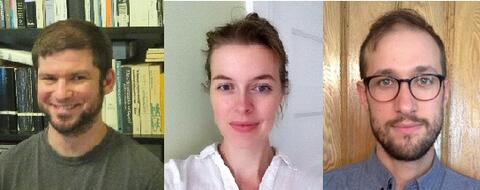
Theory and Media Studies Panel: Timothy Kreiner, Katja Lindskog, & Greg Ellermann
Timothy Kreiner’s research combines readings in cultural, economic, and political history. His current book project, The Long Downturn and its Discontents: Language Writing and the New Left, charts the shifting terrain of US poetry and politics during the long downturn in capital accumulation from 1970 to the present. This project focuses on the two great upswellings of new poetry in the period: the avowedly anti-capitalist formalism of “language writing,” and the poetry of multicultural social movements. Seeing frequently opposed literary traditions as closely linked with developments in post-1960s US culture and politics, he argues that cultural theorists attributed anti-racist, feminist, and anti-capitalist politics to opposed poetic forms as the dynamics of capitalist social reproduction began to break down in the postwar world. His second book project, The Work of Art and Unemployment, is a theory of the impact of surplus populations on twentieth century American literature.
Katja Lindskog’s research interests range across a number of genres and traditions with a particular emphasis in British 19th century literature. Currently, she is finishing a book manuscript, The Distance Effect: Images of the Past in the Nineteenth Century, which discusses literature in the context of Victorian visual culture and philosophy of history. In the book, she argues that a tradition emerges during the nineteenth century that seeks to develop a visual language that explores the striking differences between the past and the present. This emphasis on the distance between the past and the present actually works to immerse the reader more fully in the imagined past, while also cultivating a more actively critical engagement with history. Her teaching is informed by the same rigorous attention to textual detail and expansive thinking across genres and media that she seeks to convey in her research – as well as helping students find their own way to relate to, and take pleasure in, great works of literature.
Greg Ellerman’s current book project, Thought’s Wilderness: Romanticism and the Apprehension of Nature, thinks anew about the meaning of “nature” for Romantic poetry and philosophy. It argues that Romanticism’s radical experiments in verse resist the conceptual and economic appropriation of nature that underpins modern capitalism. Departing from familiar accounts of Romanticism in which nature is invariably fitted to a perceiving consciousness, he discovers in the poetry and philosophy of the period an attunement to nature’s ephemeral, ungraspable forms – forms like ether, atmosphere, ruin, and light. Rereading canonical works by Wordsworth, Wollstonecraft, Coleridge, and Percy Shelley, he identifies a Romantic poetics of the unapprehendable, opposed to the rationalization and progressive mastery of nature. His project thus reopens the once-urgent question of the complicity between conceptual and economic domination. Its unique contribution is to show how Romantic poetry, especially through the use of figuration, works to overturn hierarchical relations and to think about nature in non-appropriative ways. Chiming with recent developments in speculative philosophy and with the broad renewal of the environmental humanities, his project insists on the relevance of Romanticism, both as an artistic movement and as an academic field singularly attentive to the poetics of nature. Other research interests include the history of aesthetics, poetry and poetics, contemporary philosophy, cinema, and communist theory.